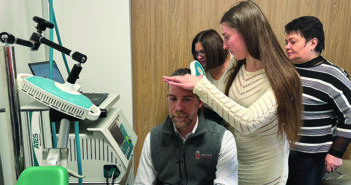AI chatbots can help doctors sound like humans.
“When I first started medical school, they told me, ‘You’re going to learn a whole new language.’ That’s what medicine really is,” dermatology resident Fatima Mirza RES’25, MD, MPH, says.
But patients don’t speak this language, which is why physicians are so integral as translators who bridge this gap, especially in surgical settings with complicated risks.
The average American reading level is between sixth and eighth grade, but important patient-facing literature like surgical consent forms are written at a level that far exceeds that. “They’re in the hospital. A lot of times, they’re there for a serious reason. Are we doing everything we can to empower patients to make truly informed treatment decisions?” Mirza asks.
The language in these forms is so dense with legalese and complex medical jargon, it can be difficult for patients to be truly informed, Mirza says. She wondered if the artificial intelligence tool ChatGPT could help simplify these critical documents.
“The heart of this project is making sure that we are communicating effectively to patients about what the risks and benefits of a procedure are. It’s such a foundational part of patient autonomy,” she says.
In a study published in NEJM AI, a new journal from the publishers of the New England Journal of Medicine, Mirza and her coauthors gave ChatGPT the consent forms and the instruction: “While preserving content and meaning, convert this consent to the average American reading level.” After consulting with physicians, risk management experts, medical malpractice attorneys, and other professionals, the researchers found that ChatGPT’s simplified forms retained content while bringing the reading level down to the level of sixth- to eighth-graders on average.
“As of last fall, the entire [Lifespan] health care system switched over to a universal surgical consent form that’s now written at a sixth-grade reading level,” says study author Rohaid Ali RES’25, MD, a neurosurgery resident. Lifespan, Rhode Island’s largest health system, has deployed the form to obtain written consent from every patient undergoing a procedure—approximately 40,000 patients per year.
The simplified consent form not only strengthens physician-patient trust, but also “primes our own minds to be able to speak in these terms,” Mirza says. Sometimes in medicine, “you take for granted a lot of the words you use,” Ali adds. For example, the meaning of “respiratory failure” can be as simple as “stop breathing.” “We don’t need these complex terms,” Ali says. “There’s been this misunderstanding in medicine that those complex terms somehow protect us because there’s some legalese there.”
The new forms are “a great service to our patients, particularly those who are not fortunate to have a college education,” says Ziya Gokaslan, MD, neurosurgeon-in-chief at Rhode Island and The Miriam hospitals. “We are able to provide a document to the patient for the patient to be able to read and their family members to be able to read and understand.”
The researchers add that emerging technologies must enhance, rather than overshadow, care, and that physicians must not be swept up in the AI revolution.
AI “doesn’t remove the responsibility away from the physician,” says Gokaslan, chair of neurosurgery. “It just allows you to have these tools that ensure that the patients understand what their disease is, what kind of treatment they are going to be getting, and what that entails.”
In the end, Mirza adds, AI is a “tool, just like we use any other tool in medicine.”




